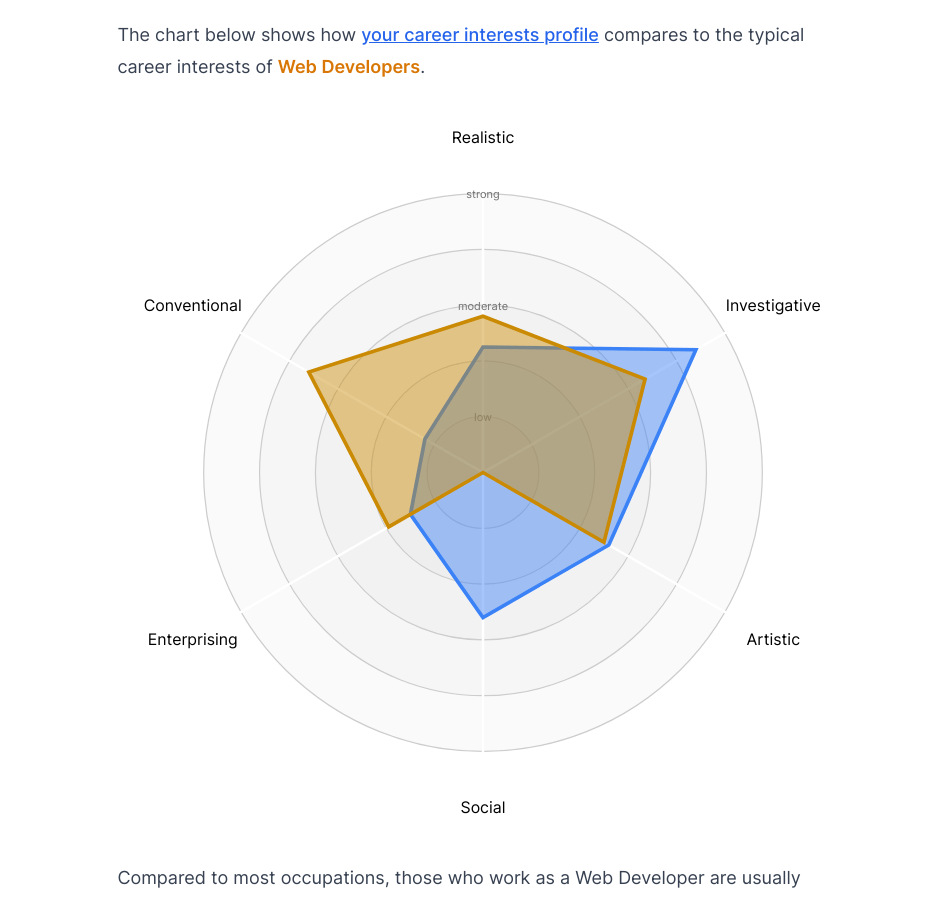Learn about typical career interests of the the INTP personality type, potential career matches, and careers to avoid.
Reading time: 5 minutes

Gregory Park, Ph.D.
Author
After a short summary of INTP career interests, you’ll find 20 potential career fits for INTPs, along with several poor fits, identified by combining data about INTP personality patterns with detailed occupational information from the U.S. Bureau of Labor Statistics.
The chart below shows where INTPs tend to fall on the classic RIASEC career interest dimensions: Realistic, Investigative, Artistic, Social, Enterprising, and Conventional.
Your unique blend of these dimensions dramatically influences how well a career feels like a good fit.
The dark blue areas show where INTPs are most likely to fall on each dimension.

Most INTPs tend to have the following pattern of interests:
High Investigative interests (Thinkers): People with strong Investigative interests prefer roles that require observation, researching, and understanding ideas. They tend to prefer working with data and ideas rather than working closely with other people. Examples include medical researchers, chemists, software engineers, scientific reporters, and statisticians.
High Realistic interests (Doers): People with high Realistic interests enjoy careers that allow them to work with their hands or tools to get a job done, rather than thinking or talking about it. They may also gravitate towards jobs with opportunities for working outdoors, competition, and risk-taking. Examples include police officers, military officers, professional athletes, farmers, builders, mechanics, forest rangers, and woodworkers.
Average Enterprising interests (Persuaders): People with strong Enterprising interests are often skilled communicators and enjoy influencing, persuading, and leading other people. They actively pursue leadership roles and opportunities to bolster their status and reputation. Examples include sales and marketing directors, politicians and political organizers, and executives.
Average Artistic interests (Creators): People with strong Artistic interests prefer jobs that require innovation through artistic and intuitive skills in less structured tasks and environments. Examples include artists, novelists, actors or actresses, musicians, curators, and designers.
Average Conventional interests (Organizers): People with strong Conventional interests excel in roles that require categorizing, planning, and systematizing information and processes. Examples include financial officers, budget analysts, office managers, database analysts, and systems administrators.
Low Social interests (Helpers): People with strong Social interests fit well with careers that involve helping, comforting, caring for, and teaching other people. Examples include physical therapists, counselors, clergy, social workers, doctors, and nurses.
However, it’s possible to find INTPs at any point on any of these six dimensions. While most INTPs have relatively low Social interests, there are still a few INTPs who score very highly on them. This is one of the limitations to using MBTI personality types for career matching. Alternatively, you can find a more precise assessment of your unique combination of personality traits, strengths, career interests, and more here at TraitLab.
Most INTPs have deep Investigative interests, pulling them towards roles with heavy demands for thinking, analysis, and research.
Many INTPs also have intense Realistic interests, meaning they will gravitate towards roles with opportunities for building and creating directly with their hands or with tools.
Some INTPs have relatively higher Enterprising interests, which fit well with roles requiring leading, persuading, and influencing other people.

Searching for a better career fit?
Compare your unique personality profile against hundreds of career paths.
People who work in the following 20 occupations tend to have similar interests to most INTPs:
Also known as Agricultural Engineer, Agricultural Systems Specialist, Conservation Engineer, Engineer, Product Engineer, Product Technology Scientist, Project Engineer, Research Agricultural Engineer
Agricultural Engineers apply knowledge of engineering technology and biological science to agricultural problems concerned with power and machinery, electrification, structures, soil and water conservation, and processing of agricultural products.
Typical pay range: $51,160 - $166,620 (annual)
Learn more about Agricultural Engineers ->
Also known as Extrusion Engineer, Materials Development Engineer, Materials Engineer, Materials Research Engineer, Metallurgical Engineer, Metallurgist, Research Engineer, Test Engineer
Materials Engineers evaluate materials and develop machinery and processes to manufacture materials for use in products that must meet specialized design and performance specifications. In addition, Materials Engineers
Typical pay range: $57,970 - $154,340 (annual)
Learn more about Materials Engineers ->
Also known as Chief Medical Technologist; Clinical Laboratory Scientist (CLS); Clinical Laboratory Technologist; Histologist Technologist; Medical Laboratory Technologist (Medical Lab Tech); Medical Technologist (MT); Medical Technologist, Clinical Laboratory Scientist; Microbiology Technologist
Clinical Laboratory Scientists perform complex medical laboratory tests for diagnosis, treatment, and prevention of disease. They also may train or supervise staff.
Typical pay range: $31,450 - $83,700 (annual)
Learn more about Clinical Laboratory Scientists ->
Also known as Design Engineer, Electronics Design Engineer, Evaluation Engineer, Integrated Circuit Design Engineer (IC Design Engineer), Product Engineer, Radio Frequency Engineer (RF Engineer), Research and Development Engineer (RD Engineer), Test Engineer
Electronics Design Engineers research, design, develop, or test electronic components and systems for commercial, industrial, military, or scientific use employing knowledge of electronic theory and materials properties. They also design electronic circuits and components for use in fields such as telecommunications, aerospace guidance and propulsion control, acoustics, or instruments and controls.
Typical pay range: $69,210 - $167,410 (annual)
Learn more about Electronics Design Engineers ->
Also known as Materials Scientist, Micro Electrical/Mechanical Systems Device Scientist (MEMS Device Scientist), Polymer Materials Consultant, Research and Development Scientist (R and D Scientist), Research Scientist, Scientist
Materials Scientists research and study the structures and chemical properties of various natural and synthetic or composite materials, including metals, alloys, rubber, ceramics, semiconductors, polymers, and glass. In addition, Materials Scientists
Typical pay range: $54,810 - $165,290 (annual)
Learn more about Materials Scientists ->
Also known as Air Pollution Control Engineer, Engineer, Engineering Consultant, Environmental Engineer, Environmental Remediation Specialist, Hazardous Substances Engineer, Sanitary Engineer
Environmental Engineers research, design, plan, or perform engineering duties in the prevention, control, and remediation of environmental hazards using various engineering disciplines. They also work may include waste treatment, site remediation, or pollution control technology.
Typical pay range: $55,450 - $144,670 (annual)
Learn more about Environmental Engineers ->
Also known as Groundwater Consultant, Hydrogeologist, Hydrologist, Physical Scientist, Research Hydrologist, Scientist, Source Water Protection Specialist
Hydrologists research the distribution, circulation, and physical properties of underground and surface waters; and study the form and intensity of precipitation and its rate of infiltration into the soil, movement through the earth, and return to the ocean and atmosphere.
Typical pay range: $52,900 - $130,030 (annual)
Learn more about Hydrologists ->
Also known as City Engineer, Civil Engineer, County Engineer, Design Engineer, Project Engineer, Railroad Design Consultant, Structural Engineer
Civil Engineers perform engineering duties in planning, designing, and overseeing construction and maintenance of building structures and facilities, such as roads, railroads, airports, bridges, harbors, channels, dams, irrigation projects, pipelines, power plants, and water and sewage systems.
Typical pay range: $56,160 - $144,810 (annual)
Learn more about Civil Engineers ->
Also known as Aeronautical Engineer, Aerospace Engineer, Aerospace Stress Engineer, Avionics Engineer, Design Engineer, Flight Controls Engineer, Flight Test Engineer, Structural Analysis Engineer, Systems Engineer, Test Engineer
Aerospace Engineers perform engineering duties in designing, constructing, and testing aircraft, missiles, and spacecraft. In addition, Aerospace Engineers
Typical pay range: $72,770 - $171,220 (annual)
Learn more about Aerospace Engineers ->
Also known as CAD Designer (Computer Aided Design Designer), CAD Operator (Computer Aided Design Operator), Design Drafter, Drafter, Drafting Technician, Mechanical Designer, Mechanical Drafter, Product Designer, Project Designer
Mechanical Drafters prepare detailed working diagrams of machinery and mechanical devices, including dimensions, fastening methods, and other engineering information.
Typical pay range: $37,100 - $92,410 (annual)
Learn more about Mechanical Drafters ->
Also known as Circuits Engineer, Design Engineer, Electrical Controls Engineer, Electrical Design Engineer, Electrical Engineer, Electrical Project Engineer, Instrumentation and Electrical Reliability Engineer (IE Reliability Engineer), Power Systems Engineer, Project Engineer, Test Engineer
Electrical Engineers research, design, develop, test, or supervise the manufacturing and installation of electrical equipment, components, or systems for commercial, industrial, military, or scientific use.
Typical pay range: $64,870 - $159,520 (annual)
Learn more about Electrical Engineers ->
Also known as Biomedical Electronics Technician, Biomedical Engineer, Biomedical Engineering Technician, Biomedical Equipment Technician (BMET), Biomedical Technician, Engineer, Process Engineer, Research Engineer, Research Scientist
Biomedical Engineers apply knowledge of engineering, biology, chemistry, computer science, and biomechanical principles to the design, development, and evaluation of biological, agricultural, and health systems and products, such as artificial organs, prostheses, instrumentation, medical information systems, and health management and care delivery systems.
Typical pay range: $56,590 - $149,440 (annual)
Learn more about Biomedical Engineers ->
Also known as Chemical Engineer, Development Engineer, Engineer, Engineering Scientist, Process Control Engineer, Process Engineer, Project Engineer, Refinery Process Engineer, Research Chemical Engineer, Scientist
Chemical Engineers design chemical plant equipment and devise processes for manufacturing chemicals and products, such as gasoline, synthetic rubber, plastics, detergents, cement, paper, and pulp, by applying principles and technology of chemistry, physics, and engineering.
Typical pay range: $68,430 - $168,960 (annual)
Learn more about Chemical Engineers ->
Also known as Engineering Geologist, Environmental Protection Geologist, Exploration Geologist, Geological Specialist, Geologist, Geophysicist, Geoscientist, Hydrogeologist, Mine Geologist, Project Geologist
Geologists study the composition, structure, and other physical aspects of the Earth. In addition, Geologists
Typical pay range: $51,890 - $201,150 (annual)
Learn more about Geologists ->
Also known as Food and Drug Research Scientist, Food Chemist, Food Engineer, Food Scientist, Food Technologist, Formulator, Product Development Scientist, Research Chef, Research Food Technologist, Research Scientist
Food Scientists use chemistry, microbiology, engineering, and other sciences to study the principles underlying the processing and deterioration of foods; analyze food content to determine levels of vitamins, fat, sugar, and protein; discover new food sources; research ways to make processed foods safe, palatable, and healthful; and apply food science knowledge to determine best ways to process, package, preserve, store, and distribute food.
Typical pay range: $41,240 - $130,430 (annual)
Learn more about Food Scientists ->
Also known as Information Analyst, Information Systems Manager (IS Manager), Information Technology Specialist (IT Specialist), LAN Specialist (Local Area Network Specialist), Local Area Network Administrator (LAN Administrator), Network Administrator, Network Coordinator, Network Manager, Systems Administrator
Systems Adminstrators install, configure, and maintain an organization’s local area network (LAN), wide area network (WAN), data communications network, operating systems, and physical and virtual servers. In addition, Systems Adminstrators
Typical pay range: $52,830 - $134,970 (annual)
Learn more about Systems Adminstrators ->
Also known as Aquatic Biologist, Conservation Resources Management Biologist, Fish and Wildlife Biologist, Fisheries Biologist, Fisheries Management Biologist, Habitat Biologist, Migratory Game Bird Biologist, Wildlife Biologist, Zoologist
Zoologists study the origins, behavior, diseases, genetics, and life processes of animals and wildlife. In addition, Zoologists
Typical pay range: $41,720 - $106,320 (annual)
Learn more about Zoologists ->
Also known as Conservationist, Environmental Analyst, Erosion Control Specialist, Land Manager, Land Reclamation Specialist, Land Resource Specialist, Resource Conservation Specialist, Resource Conservationist, Soil Conservationist
Conservation Scientists manage, improve, and protect natural resources to maximize their use without damaging the environment. In addition, Conservation Scientists
Typical pay range: $39,230 - $100,350 (annual)
Learn more about Conservation Scientists ->
Also known as Technology Applications Engineer, Web Architect, Web Design Specialist, Web Designer, Web Developer, Webmaster
Web Developers develop and implement websites, web applications, application databases, and interactive web interfaces. In addition, Web Developers
Typical pay range: $40,750 - $146,430 (annual)
Learn more about Web Developers ->
Also known as Biological Science Aide, Forest Technician, Forestry Aide, Forestry Technician, Resource Technician, Timber Appraiser
Forest Technicians provide technical assistance regarding the conservation of soil, water, forests, or related natural resources. In addition, Forest Technicians
Typical pay range: $27,970 - $60,910 (annual)
Learn more about Forest Technicians ->
Most INTPs would struggle to enjoy careers that consistently demand Social and Conventional interests. These careers would high amounts of caring, nurturing, and organization.
A few examples include: